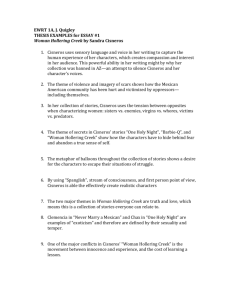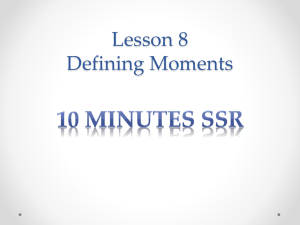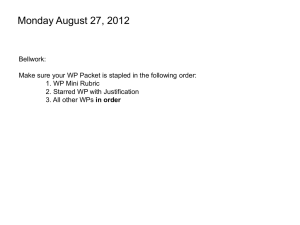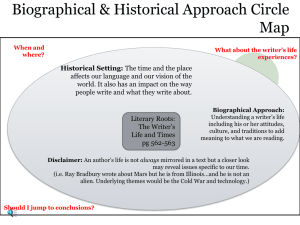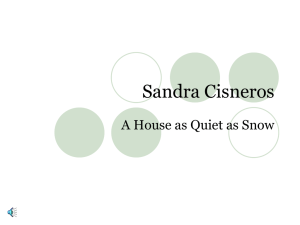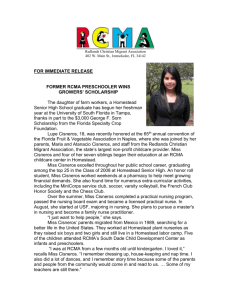NEW Sandra Cisneros - English
advertisement
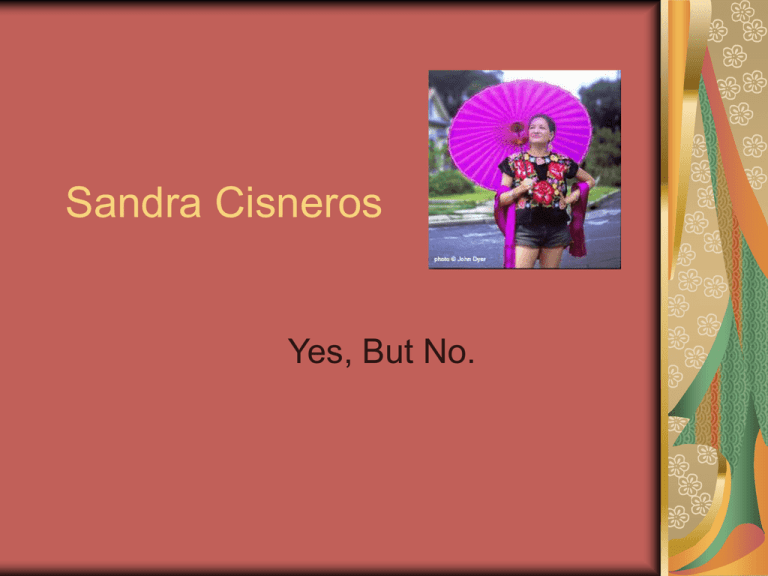
Sandra Cisneros Yes, But No. The 1980’s The Canon allowed for new voices to be heard in American literature that had been previously been silenced by racism, poverty and gender marginalization. Most Chicanos had been outsiders twice over and were not able to conform to literary standards or maintain their own voice. However, she was able to jump into the explosive bandwagon of the opening canon. Humble Beginnings The only girl out of seven children, Cisneros was born in December of 1954 in Chicago. Her dad’s family came from extreme wealth before the Mexican revolution and had a fine house in Mexico City. Her great-grandfather even played piano for the President of Mexico at his Mansion in Mexico city. Humble Beginnings However, they were big gamblers and lost a lot of their money gambling. Her grandfather went into the military and survived the Mexican revolution. This is the story of Narciso and Soledad in Caramelo. Humble Beginnings Pg.132, 174, 188,192 & 196 This is very similar to the Bildungsroman, except your main character, Celaya, is not only female but Chicano. These stories are in place to create a rich texture of belonging and identity for the main character so she can find a home within her culture. Humble Beginnings Cisneros’ father, Alfredo, was supposed to graduate college but dropped out and ran away to the United States. His dad was furious because that was his life savings—educating his son. Humble Beginnings Pages: 198,205,210,222 These tell the story of Inocencio Reyes and Zoila Reyna, Cisneros, parents. A one day stop over in Chicago turned into a month and then a lifetime because he fell in love with Cisneros’ mother, Elvira Cordero. Humble Beginnings Of her mother’s family, Cisneros simply states that her history is “blurred and broken and that it is “simple and much more humble that that of [her] father’s, but in many ways more admirable (Cisneros 67).” Since her father was now regretting throwing away his education, he now had to find a way to support his family and so he learned to be an upholsterer. Travel Once established in this business, they began migrating regularly back and forth from Chicago and Mexico throughout her childhood on a voluntary basis. Cisneros describes this as almost obsessive and deeply rooted in his relationship with mother. Travel Cisneros describes her grandmother as a “hysterical woman, oversentimental, spoiled (Come to think of it, she was not unlike myself.) She had favorites. Her best baby was my father whom she held tight to. As a result, we returned to Chicago, we had to find a new place to live, a new school. (55-56).” Travel As explained in Caramelo, this was difficult because it constantly left them without any financial security and constantly starting over. Furthermore, it left them without creditability for a long time. Travel For Cisneros, it left her introverted and she often read and studied as a way of compensating for her loneliness. It only fueled her desire to be a writer. She felt out because each of her brothers had a built in play mate and she had no one. Educational Values Despite the fact that it was her dad who had some college, it was her mom who had made sure that Sandra Cisneros had her own library card even before she could read. Unlike most Hispanic children, she had more free time to read, write and study than others. Her mother saw to that for her. Educational Values She felt that if the sister who was born after her (and died) had lived, she might have had a regular playmate. Also, if they had lived in the same place all the time. 1966 they had borrowed enough money to buy a house and end the nomadic lifestyle (she was eleven). Permanent Locations While this still took place in Chicago, the North Side in a place called Humboldt Park, in Caramelo, they move to Texas. Pgs 299, 311,318. While these people are also reflected in her other and original work, House on Mango Street, she uses the experience again which is common and even necessary in the Bildungsroman. Beginning as a Writer At the age of ten, she began to write her first poem but then doesn’t write any more until her sophomore year of high school. An English teacher and poet, helped her recapture her love of poetry. “Somewhere here, amidst the tumult of Viet Nam War and ecological awareness, I began my first poems. There were filled with pleas for peace and saving the environment. Here and there I three in a few catchy words like ecology and Coca-Cola. Despite all of this, I continued writing and began to be known as the poet” (Cisneros 58).” Undergraduate While at Loyola University, she didn’t do much writing again until her junior year when she took a Creative Writing class. She was encouraged to study at the famous Iowa’s Writer’s Workshop where she originally began to study with poet Donald Justice. Iowa Writer’s Workshop However, he left to go on sabbatical and she began feeling depressed, isolated and homesick. She also began to feel that the workshop was “was East Coast pretentious and operated totally without mercy or kind words ( qtd in Perloff 89). Iowa Writer’s Workshop She left all she was doing was imitating certain kinds of writing and really finding her own voice. That spring, she enrolled in a seminar where they were discussing The Poetics of Space by Gaston Bachelard in a class called “Memory and Imagination.” Iowa Writer’s Workshop Cisneros realized what had been missing—a sense of home and even more than that, a voice about that home—since her childhood was so displaced and she felt displaced in Iowa. She talked about this experience often in interviews about writing and how she reconnected with herself. Iowa Writer’s Workshop “What [do I] know? What could I know? My classmates were from the best schools in the country. They had been bred as fine hothouse flowers. I was a yellow weed among the city’s cracks.” It was then she had learned to write about something her classmates could not understand or have experienced and could never experience. She wrote about being Chicano. Iowa Writer’s Workshop 1978, she earned her MFA from Iowa and then taught Creative Writing for three years to (former) high school drop outs at Chicago’s Latino Youth Alternative High School. 1984 House on Mango Street was published (even made into a movie) My Wicked, Wicked, Ways was published in 1987 to enthusiastic reviews. Writing Career She teaches many writers in residence programs through out the country as well as gives readings. 1991 Woman Hollering Creek was published which is a collection of short stories with Random House. This makes her a “real” author and not obscure writer any longer. Writing Career When asked by NPR about her success as the only Chicano with a major publishing house in 1991, she replied: “I think I can’t be happy if I’m the only one that’s getting published by Random House when I know there are such magnificent writers—Latinos and Latinas, both Chicanos and Chicanas in the U.S. whose presses or whom the mainstream isn’t even aware of. And, you know, if my success means that other presses will take a second at these writers…and publish them in larger numbers then our ship will come in.” Writing Career 2002 Caramelo came out as probably the most significant book in Chicano literature according to critics. It was also a national best seller proving that Americans of all races want to learn more as well as enjoy books about the Latino/Latina culture. Critics Most of them feel her descriptions are a mixture of prose (fiction) and poetry. She feels that if she has the words to express her idea, it’s fiction and if she doesn’t, it’s poetry. Choices While Cisneros enjoys her life and her family, she refuses to settle down and get married. She feels that she owns her own life and enjoys her freedom as a person to move along without emotional restraints. Something her multiple family members don’t understand.
